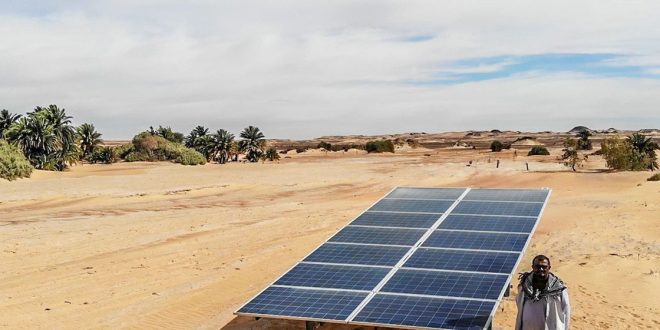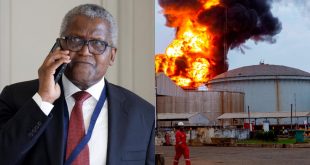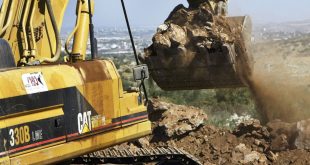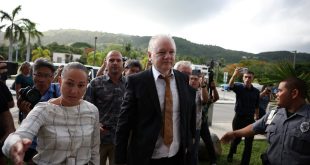Mr. Thiaw spoke to UN News ahead of the World Day to Combat Desertification and Drought, marked annually on 17 June
Ibrahim Thiaw: Desertification is happening at the local level as much as it is global. Unless we address this at the local level, we will never be able to actually control it at the global level. Global policies and global decisions are needed.
The impacts are huge in terms of food security and food sovereignty.
It also drives forced migration. If people can no longer produce food on their land then they will migrate. As we have seen for example in the Sahel or Haiti, there can be severe consequences for global security. When people fight over access to land and water, it leads to more conflicts. We are seeing more of this, and it has consequences on the homogeneity of communities and on national economies.
It is estimated that up to 50 per cent of the global GDP might lost by 2050 due to challenges with agriculture and food production unless we address the issue of land loss and desertification.
UN News:What is the trend right now in terms of land loss?
Ibrahim Thiaw: Land loss is happening all over the world and land degradation is affecting both arid and less arid lands.
But in terms of drylands and desertification, it is estimated that 45 per cent of the land surface is affected by desertification. Maybe it is more striking to say that 3.2 billion people or one third of the world population are affected by that.
Every year a hundred million hectares of land is being degraded, an area the size of Egypt. We need to halt land degradation, but we also need to restore 1.5 billion hectares of land.
UN News:How are you going to do that?
Ibrahim Thiaw: By improving the techniques of agriculture, reducing the impact we are having on land in terms of extraction of minerals and other extractive industries. It is also important that we reduce the pressure in terms of people activities in some parts of the world so as to diversify the economy and create more opportunities to create income.
Restoring degraded land is not an expensive activity to undertake, but it is absolutely essential to provide more food security and to reduce conflicts. Every single dollar invested in land restoration can generate up to $30 in economic benefits, so investment in restoration activities is quite profitable from the economic point of view.
This is not just the responsibility of local communities but also of governments and crucially of the private sector because the largest driver of land use in the world is big agriculture.
UN News: Are we talking mainly about small developing countries?
Ibrahim Thiaw: No. It’s a global phenomenon that is affecting all countries including the United States, India, China, India or Pakistan.
But the impact is much more severe in small countries, and small economies that do not have reserves, nor the insurance systems to protect their people. And the level of vulnerability is much higher in communities whose revenues are only based on the income they can generate from land.
UN News Desertification doesn’t exist in isolation. How does it relate to climate change?
Ibrahim Thiaw: Desertification is an amplifier of climate change. Climate change is an amplifier of desertification because of course, with extreme events, you also have severe impact on land and on communities and local economies.

© IOM/Alexander Bee
Many migrants, like these ones in Djibouti, are leaving home because they can no longer live off their land.
So basically, they are mutually interacting and it is therefore important to have a more comprehensive global picture. It is wrong to think that you can protect biodiversity or the land without tackling the climate issue and vice versa.
UN News: The small-scale interventions at a local level are very important, but it sounds as though it’s going to need a huge push from governments, from the private sector to make a real difference?
Ibrahim Thiaw: Yes, we should not discard all of the efforts that are being made by the local communities day in, day out. They need much more support from governments. They also need to see less subsidies for the agriculture industry, that is destroying the environment. Public money that, in some cases, is destroying the environment should be used to actually rebuild economies.
So, it is not necessarily that we need to inject more money, but we need to better spend the money that we have.
UN News: I guess some would say that’s quite an over optimistic view that governments will be changing the way they spend their money?
Ibrahim Thiaw: Well, no, it makes sense politically. As a taxpayer, I would like to see where my money is going. If it is being invested in activities that are destroying my environment and creating eco-anxiety for my children, destroying the livelihoods of my communities, then as a voter, I would insist that my government invests my money in other areas that would be generating more income for me and creating more sustainability.
UN News: You’re from Mauritania in the Sahel. Have you seen this land degradation happen in real time?
Ibrahim Thiaw: The situation is very sad. I’ve seen land degradation in my lifetime. But at the same time, I also have a lot of hope because I see positive changes coming. I see the younger generation being conscious of the fact that they need to reverse the trend.
I see more farmers and pastoralists trying to do their bit. I see more interventions from the international community, including from the humanitarian world that are investing in land restoration. So, I see a movement which gives me some hope that if we join our efforts and if we work in a collaborative manner, it would be possible to actually reverse the trend.
And the best hope I have is energy, which was the missing link for development and for small and medium enterprises. Energy is now accessible in remote places thanks to our ability to harness solar and wind energy.
And the possibility of combining energy and agriculture is very positive, as you can harvest water, store food, reduce the food loss. You can process that food to create chains at the local level.
 Top Naija News – Nigeria News, Nigerian News & Top Stories Top Naija News – Nigerian Newspapers, Nigerian News. topnaijanews is a daily Nigerian newspaper covering Latest News, Breaking News, Entertainment, Sports, Lifestyle and Politics.
Top Naija News – Nigeria News, Nigerian News & Top Stories Top Naija News – Nigerian Newspapers, Nigerian News. topnaijanews is a daily Nigerian newspaper covering Latest News, Breaking News, Entertainment, Sports, Lifestyle and Politics.




